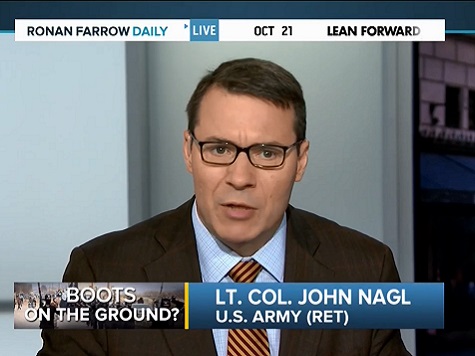Retired Army Lt. Col. John Nagl, one of the authors of the “U.S. Army/Marine Corps Counterinsurgency Field Manual” argued that the US should increase its forces in Iraq “by probably a factor of 10” on Tuesday’s “Ronan Farrow Daily” on MSNBC.
“We currently have about 1,500 American advisers on the ground in Iraq. I think we need to multiply that by probably a factor of 10 and we need to push those advisors closer to the fighting, put those advisers inside Iraqi units, Peshmerga, Kurdish units and that will increase their reliability it will allow us to provide intelligence to the forces about ISIS, make them more effective against ISIS. It will allow us to gather intelligence and make sure that none of them have been infiltrated” he said. And “there is no substitute for some American boots on the ground. We’ve got 1,500 guys on the ground, but they’re not as far forward as they need to be to make a real, immediate impact on the battlefield.”
Nagl added “most of the fighting should be done by Iraqi forces and by Kurdish forces. But they’re going to be far more effective, they’re going to take action more rapidly and more effectively [with] fewer losses, they’ll be able to push ISIS back faster if those Americans are embedded with them, calling in airstrikes and bringing in logistics, providing intelligence, right at the front edge of the battlefield.” He argued, “there is some risk to those Americans if we do that, but I think that is less risky than allowing ISIS to continue to advance.”
Nagl also lamented that the situation with ISIS in Iraq and Syria was “entirely foreseeable and entirely preventable,” and expressed that “the administration made a mistake by pulling all American advisers out of Iraq at the end of 2011 and also in not choosing to arm, train, and equip the moderate Syrian rebels in the summer of 2012. Had they done so, ISIS would not control territory the size of Maryland right now, would not be conducting jihadi training right now, would not be the biggest name in international jihad at this moment. And so, I am deeply concerned we waited too long.”
Follow Ian Hanchett on Twitter @IanHanchett

COMMENTS
Please let us know if you're having issues with commenting.